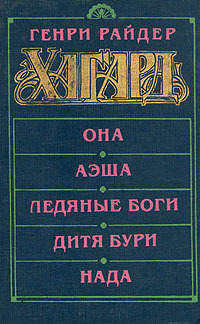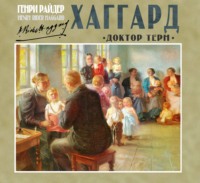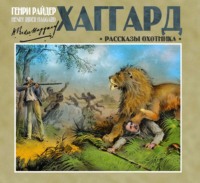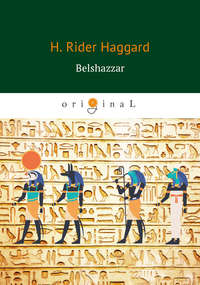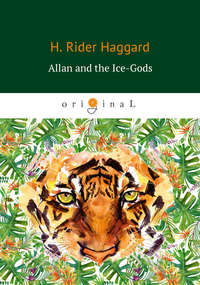
Полная версия
Ayesha: The Return of She
Between us and the mouth of the gulley rose, or rather sank, a sheer precipice that was apparently three or four hundred feet in depth, and at its foot we could hear the sound of water.
Right to the edge of this precipice ran the path, for one of the stone pillars stood upon its extreme brink, and yet how could a road descend such a place as that? We stared aghast; then a possible solution occurred to us.
“Don’t you see,” said Leo, with a hollow laugh, “the gulf has opened since this track was used: volcanic action probably.”
“Perhaps, or perhaps there was a wooden bridge or stairway which has rotted. It does not matter. We must find another path, that is all,” I answered as cheerfully as I could.
“Yes, and soon,” he said, “if we do not wish to stop here for ever.”
So we turned to the right and marched along the edge of the precipice till, a mile or so away, we came to a small glacier, of which the surface was sprinkled with large stones frozen into its substance. This glacier hung down the face of the cliff like a petrified waterfall, but whether or no it reached the foot we could not discover. At any rate, to think of attempting its descent seemed out of the question. From this point onwards we could see that the precipice increased in depth and far as the eye could reach was absolutely sheer.
So we went back again and searched to the left of our road. Here the mountains receded, so that above us rose a mighty, dazzling slope of snow and below us lay that same pitiless, unclimbable gulf. As the light began to fade we perceived, half a mile or more in front a bare-topped hillock of rock, which stood on the verge of the precipice, and hurried to it, thinking that from its crest we might be able to discover a way of descent.
When at length we had struggled to the top, it was about a hundred and fifty feet high; what we did discover was that, here also, as beyond the glacier, the gulf was infinitely deeper than at the spot where the road ended, so deep indeed that we could not see its bottom, although from it came the sound of roaring water. Moreover, it was quite half a mile in width.
Whilst we stared round us the sinking sun vanished behind a mountain and, the sky being heavy, the light went out like that of a candle. Now the ascent of this hillock had proved so steep, especially at one place, where we were obliged to climb a sort of rock ladder, that we scarcely cared to attempt to struggle down it again in that gloom. Therefore, remembering that there was little to choose between the top of this knoll and the snow plain at its foot in the matter of temperature or other conveniences, and being quite exhausted, we determined to spend the night upon it, thereby, as we were to learn, saving our lives.
Unloading the yak, we pitched our tent under the lee of the topmost knob of rock and ate a couple of handfuls of dried fish and corn-cake. This was the last of the food that we had brought with us from the Lamasery, and we reflected with dismay that unless we could shoot something, our commissariat was now represented by the carcass of our old friend the yak. Then we wrapped ourselves up in our thick rugs and fur garments and forgot our miseries in sleep.
It cannot have been long before daylight when we were awakened by a sudden and terrific sound like the boom of a great cannon, followed by thousands of other sounds, which might be compared to the fusillade of musketry.
“Great Heaven! What is that?” I said.
We crawled from the tent, but as yet could see nothing, whilst the yak began to low in a terrified manner. But if we could not see we could hear and feel. The booming and cracking had ceased, and was followed by a soft, grinding noise, the most sickening sound, I think, to which I ever listened. This was accompanied by a strange, steady, unnatural wind, which seemed to press upon us as water presses. Then the dawn broke and we saw.
The mountain-side was moving down upon us in a vast avalanche of snow.
Oh! what a sight was that. On from the crest of the precipitous slopes above, two miles and more away, it came, a living thing, rolling, sliding, gliding; piling itself in long, leaping waves, hollowing itself into cavernous valleys, like a tempest-driven sea, whilst above its surface hung a powdery cloud of frozen spray.
As we watched, clinging to each other terrified, the first of these waves struck our hill, causing the mighty mass of solid rock to quiver like a yacht beneath the impact of an ocean roller, or an aspen in a sudden rush of wind. It struck and slowly separated, then with a majestic motion flowed like water over the edge of the precipice on either side, and fell with a thudding sound into the unmeasured depths beneath. And this was but a little thing, a mere forerunner, for after it, with a slow, serpentine movement, rolled the body of the avalanche.
It came in combers, it came in level floods. It piled itself against our hill, yes, to within fifty feet of the head of it, till we thought that even that rooted rock must be torn from its foundations and hurled like a pebble to the deeps beneath. And the turmoil of it all! The screaming of the blast caused by the compression of the air, the dull, continuous thudding of the fall of millions of tons of snow as they rushed through space and ended their journey in the gulf.
Nor was this the worst of it, for as the deep snows above thinned, great boulders that had been buried beneath them, perhaps for centuries, were loosened from their resting-places and began to thunder down the hill. At first they moved slowly, throwing up the hard snow around them as the prow of a ship throws foam. Then gathering momentum, they sprang into the air with leaps such as those of shells ricocheting upon water, till in the end, singing and hurtling, many of them rushed past and even over us to vanish far beyond. Some indeed struck our little mountain with the force of shot fired from the great guns of a battle-ship, and shattered there, or if they fell upon its side, tore away tons of rock and passed with them into the chasm like a meteor surrounded by its satellites. Indeed, no bombardment devised and directed by man could have been half so terrible or, had there been anything to destroy, half so destructive.
The scene was appalling in its unchained and resistless might evolved suddenly from the completest calm. There in the lap of the quiet mountains, looked down upon by the peaceful, tender sky, the powers hidden in the breast of Nature were suddenly set free, and, companioned by whirlwinds and all the terrifying majesty of sound, loosed upon the heads of us two human atoms.
At the first rush of snow we had leapt back behind our protecting peak and, lying at full length upon the ground, gripped it and clung there, fearing lest the wind should whirl us to the abyss. Long ago our tent had gone like a dead leaf in an autumn gale, and at times it seemed as if we must follow.
The boulders hurtled over and past us; one of them, fell full upon the little peak, shattering its crest and bursting into fragments, which fled away, each singing its own wild song. We were not touched, but when we looked behind us it was to see the yak, which had risen in its terror, lying dead and headless. Then in our fear we lay still, waiting for the end, and wondering dimly whether we should be buried in the surging snow or swept away with the hill, or crushed by the flying rocks, or lifted and lost in the hurricane.
How long did it last? We never knew. It may have been ten minutes or two hours, for in such a scene time loses its proportion. Only we became aware that the wind had fallen, while the noise of grinding snow and hurtling boulders ceased. Very cautiously we gained our feet and looked.
In front of us was sheer mountain side, for a depth of over two miles, the width of about a thousand yards, which had been covered with many feet of snow, was now bare rock. Piled up against the face of our hill, almost to its summit, lay a tongue of snow, pressed to the consistency of ice and spotted with boulders that had lodged there. The peak itself was torn and shattered, so that it revealed great gleaming surfaces and pits, in which glittered mica, or some other mineral. The vast gulf behind was half filled with the avalanche and its debris. But for the rest, it seemed as though nothing had happened, for the sun shone sweetly overhead and the solemn snows reflected its rays from the sides of a hundred hills. And we had endured it all and were still alive; yes, and unhurt.
But what a position was ours! We dared not attempt to descend the mount, lest we should sink into the loose snow and be buried there. Moreover, all along the breadth of the path of the avalanche boulders from time to time still thundered down the rocky slope, and with them came patches of snow that had been left behind by the big slide, small in themselves, it is true, but each of them large enough to kill a hundred men. It was obvious, therefore, that until these conditions changed, or death released us, we must abide where we were upon the crest of the hillock.
So there we sat, foodless and frightened, wondering what our old friend Kou-en would say if he could see us now. By degrees hunger mastered all our other sensations and we began to turn longing eyes upon the headless body of the yak.
“Let’s skin him,” said Leo, “it will be something to do, and we shall want his hide to-night.”
So with affection, and even reverence, we performed this office for the dead companion of our journeyings, rejoicing the while that it was not we who had brought him to his end. Indeed, long residence among peoples who believed fully that the souls of men could pass into, or were risen from, the bodies of animals, had made us a little superstitious on this matter. It would be scarcely pleasant, we reflected, in some future incarnation, to find our faithful friend clad in human form and to hear him bitterly reproach us for his murder.
Being dead, however, these arguments did not apply to eating him, as we were sure he would himself acknowledge. So we cut off little bits of his flesh and, rolling them in snow till they looked as though they were nicely floured, hunger compelling us, swallowed them at a gulp. It was a disgusting meal and we felt like cannibals: but what could we do?
Chapter 5
The Glacier
Even that day came to an end at last, and after a few more lumps of yak, our tent being gone, we drew his hide over us and rested as best we could, knowing that at least we had no more avalanches to fear. That night it froze sharply, so that had it not been for the yak’s hide and the other rugs and garments, which fortunately we were wearing when the snow-slide began, it would, I think, have gone hard with us. As it was, we suffered a great deal.
“Horace,” said Leo at the dawn, “I am going to leave this. If we have to die, I would rather do so moving; but I don’t believe that we shall die.”
“Very well,” I said, “let us start. If the snow won’t bear us now, it never will.”
So we tied up our rugs and the yak’s hide in two bundles and, having cut off some more of the frozen meat, began our descent. Now, although the mount was under two hundred feet high, its base, fortunately for us – for otherwise it must have been swept away by the mighty pressure of the avalanche – was broad, so that there was a long expanse of piled-up snow between us and the level ground.
Since, owing to the overhanging conformation of the place, it was quite impossible for us to descend in front where pressure had made the snow hard as stone, we were obliged to risk a march over the looser material upon its flank. As there was nothing to be gained by waiting, off we went, Leo leading and step by step trying the snow. To our joy we discovered that the sharp night frost had so hardened its surface that it would support us. About half way down, however, where the pressure had been less, it became much softer, so that we were forced to lie upon our faces, which enabled us to distribute our weight over a larger surface, and thus slither gently down the hill.
All went well until we were within twenty paces of the bottom, where we must cross a soft mound formed of the powdery dust thrown off by the avalanche in its rush. Leo slipped over safely, but I, following a yard or two to his right, of a sudden felt the hard crust yield beneath me. An ill-judged but quite natural flounder and wriggle, such as a newly-landed flat-fish gives upon the sand, completed the mischief, and with one piercing but swiftly stifled yell, I vanished.
Any one who has ever sunk in deep water will know that the sensation is not pleasant, but I can assure him that to go through the same experience in soft snow is infinitely worse; mud alone could surpass its terrors. Down I went, and down, till at length I seemed to reach a rock which alone saved me from disappearing for ever. Now I felt the snow closing above me and with it came darkness and a sense of suffocation. So soft was the drift, however, that before I was overcome I contrived with my arms to thrust away the powdery dust from about my head, thus forming a little hollow into which air filtered slowly. Getting my hands upon the stone, I strove to rise, but could not, the weight upon me was too great.
Then I abandoned hope and prepared to die. The process proved not altogether unpleasant. I did not see visions from my past life as drowning men are supposed to do, but – and this shows how strong was her empire over me – my mind flew back to Ayesha. I seemed to behold her and a man at her side, standing over me in some dark, rocky gulf. She was wrapped in a long travelling cloak, and her lovely eyes were wild with fear. I rose to salute her, and make report, but she cried in a fierce, concentrated voice —
“What evil thing has happened here? Thou livest; then where is my lord Leo? Speak, man, and say where thou hast hid my lord – or die.”
The vision was extraordinarily real and vivid, I remember, and, considered in connection with a certain subsequent event, in all ways most remarkable, but it passed as swiftly as it came.
Then my senses left me.
I saw a light again. I heard a voice, that of Leo. “Horace,” he cried, “Horace, hold fast to the stock of the rifle.” Something was thrust against my outstretched hand. I gripped it despairingly, and there came a strain. It was useless, I did not move. Then, bethinking me, I drew up my legs and by chance or the mercy of Heaven, I know not, got my feet against a ridge of the rock on which I was lying. Again I felt the strain, and thrust with all my might. Of a sudden the snow gave, and out of that hole I shot like a fox from its earth.
I struck something. It was Leo straining at the gun, and I knocked him backwards. Then down the steep slope we rolled, landing at length upon the very edge of the precipice. I sat up, drawing in the air with great gasps, and oh! how sweet it was. My eyes fell upon my hand, and I saw that the veins stood out on the back of it, black as ink and large as cords. Clearly I must have been near my end.
“How long was I in there?” I gasped to Leo, who sat at my side, wiping off the sweat that ran from his face in streams.
“Don’t know. Nearly twenty minutes, I should think.”
“Twenty minutes! It seemed like twenty centuries. How did you get me out? You could not stand upon the drift dust.”
“No; I lay upon the yak skin where the snow was harder and tunnelled towards you through the powdery stuff with my hands, for I knew where you had sunk and it was not far off. At last I saw your finger tips; they were so blue that for a few seconds I took them for rock, but thrust the butt of the rifle against them. Luckily you still had life enough to catch hold of it, and you know the rest. Were we not both very strong, it could never have been done.”
“Thank you, old fellow,” I said simply.
“Why should you thank me?” he asked with one of his quick smiles. “Do you suppose that I wished to continue this journey alone? Come, if you have got your breath, let us be getting on. You have been sleeping in a cold bed and want exercise. Look, my rifle is broken and yours is lost in the snow. Well, it will save us the trouble of carrying the cartridges,” and he laughed drearily.
Then we began our march, heading for the spot where the road ended four miles or so away, for to go forward seemed useless. In due course we reached it safely. Once a mass of snow as large as a church swept down just in front of us, and once a great boulder loosened from the mountain rushed at us suddenly like an attacking lion, or the stones thrown by Polyphemus at the ship of Odysseus, and, leaping over our heads, vanished with an angry scream into the depths beneath. But we took little heed of these things: our nerves were deadened, and no danger seemed to affect them.
There was the end of the road, and there were our own footprints and the impress of the yak’s hoofs in the snow. The sight of them affected me, for it seemed strange that we should have lived to look upon them again. We stared over the edge of the precipice. Yes, it was sheer and absolutely unclimbable.
“Come to the glacier,” said Leo.
So we went on to it, and scrambling a little way down its root, made an examination. Here, so far as we could judge, the cliff was about four hundred feet deep. But whether or no the tongue of ice reached to the foot of it we were unable to tell, since about two thirds of the way down it arched inwards, like the end of a bent bow, and the conformation of the overhanging rocks on either side was such that we could not see where it terminated. We climbed back again and sat down, and despair took hold of us, bitter, black despair.
“What are we to do?” I asked. “In front of us death. Behind us death, for how can we recross those mountains without food or guns to shoot it with? Here death, for we must sit and starve. We have striven and failed. Leo, our end is at hand. Only a miracle can save us.”
“A miracle,” he answered. “Well, what was it that led us to the top of the mount so that we were able to escape the avalanche? And what was it which put that rock in your way as you sank into the bed of dust, and gave me wit and strength to dig you out of your grave of snow? And what is it that has preserved us through seventeen years of dangers such as few men have known and lived? Some directing Power. Some Destiny that will accomplish itself in us. Why should the Power cease to guide? Why should the Destiny be baulked at last?”
He paused, then added fiercely, “I tell you, Horace, that even if we had guns, food, and yaks, I would not turn back upon our spoor, since to do so would prove me a coward and unworthy of her. I will go on.”
“How?” I asked.
“By that road,” and he pointed to the glacier.
“It is a road to death!”
“Well, if so, Horace, it would seem that in this land men find life in death, or so they believe. If we die now, we shall die travelling our path, and in the country where we perish we may be born again. At least I am determined, so you must choose.”
“I have chosen long ago. Leo, we began this journey together and we will end it together. Perhaps Ayesha knows and will help us,” and I laughed drearily. “If not – come, we are wasting time.”
Then we took counsel, and the end of it was that we cut a skin rug and the yak’s tough hide into strips and knotted these together into two serviceable ropes, which we fastened about our middles, leaving one end loose, for we thought that they might help us in our descent.
Next we bound fragments of another skin rug about our legs and knees to protect them from the chafing of the ice and rocks, and for the same reason put on our thick leather gloves. This done, we took the remainder of our gear and heavy robes and, having placed stones in them, threw them over the brink of the precipice, trusting to find them again, should we ever reach its foot. Now our preparations were complete, and it was time for us to start upon perhaps one of the most desperate journeys ever undertaken by men of their own will.
Yet we stayed a little, looking at each other in piteous fashion, for we could not speak. Only we embraced, and I confess, I think I wept a little. It all seemed so sad and hopeless, these longings endured through many years, these perpetual, weary travellings, and now – the end. I could not bear to think of that splendid man, my ward, my most dear friend, the companion of my life, who stood before me so full of beauty and of vigour, but who must within a few short minutes be turned into a heap of quivering, mangled flesh. For myself it did not matter. I was old, it was time that I should die. I had lived innocently, if it were innocent to follow this lovely image, this Siren of the caves, who lured us on to doom.
No, I don’t think that I thought of myself then, but I thought a great deal of Leo, and when I saw his determined face and flashing eyes as he nerved himself to the last endeavour, I was proud of him. So in broken accents I blessed him and wished him well through all the aeons, praying that I might be his companion to the end of time. In few words and short he thanked me and gave me back my blessing. Then he muttered —
“Come.”
So side by side we began the terrible descent. At first it was easy enough, although a slip would have hurled us to eternity. But we were strong and skilful, accustomed to such places moreover, and made none. About a quarter of the way down we paused, standing upon a great boulder that was embedded in the ice, and, turning round cautiously, leaned our backs against the glacier and looked about us. Truly it was a horrible place, almost sheer, nor did we learn much, for beneath us, a hundred and twenty feet or more, the projecting bend cut off our view of what lay below.
So, feeling that our nerves would not bear a prolonged contemplation of that dizzy gulf, once more we set our faces to the ice and proceeded on the downward climb. Now matters were more difficult, for the stones were fewer and once or twice we must slide to reach them, not knowing if we should ever stop again. But the ropes which we threw over the angles of the rocks, or salient points of ice, letting ourselves down by their help and drawing them after us when we reached the next foothold, saved us from disaster.
Thus at length we came to the bend, which was more than half way down the precipice, being, so far as I could judge, about two hundred and fifty feet from its lip, and say one hundred and fifty from the darksome bottom of the narrow gulf. Here were no stones, but only some rough ice, on which we sat to rest.
“We must look,” said Leo presently.
But the question was, how to do this. Indeed, there was only one way, to hang over the bend and discover what lay below. We read each other’s thought without the need of words, and I made a motion as though I would start.
“No,” said Leo, “I am younger and stronger than you. Come, help me,” and he began to fasten the end of his rope to a strong, projecting point of ice. “Now,” he said, “hold my ankles.”
It seemed an insanity, but there was nothing else to be done, so, fixing my heels in a niche, I grasped them and slowly he slid forward till his body vanished to the middle. What he saw does not matter, for I saw it all afterwards, but what happened was that suddenly all his great weight came upon my arms with such a jerk that his ankles were torn from my grip.
Or, who knows! perhaps in my terror I loosed them, obeying the natural impulse which prompts a man to save his own life. If so, may I be forgiven, but had I held on, I must have been jerked into the abyss. Then the rope ran out and remained taut.
“Leo!” I screamed, “Leo!” and I heard a muffled voice saying, as I thought, “Come.” What it really said was – ”Don’t come.” But indeed – and may it go to my credit – I did not pause to think, but face outwards, just as I was sitting, began to slide and scramble down the ice.
In two seconds I had reached the curve, in three I was over it. Beneath was what I can only describe as a great icicle broken off short, and separated from the cliff by about four yards of space. This icicle was not more than fifteen feet in length and sloped outwards, so that my descent was not sheer. Moreover, at the end of it the trickling of water, or some such accident, had worn away the ice, leaving a little ledge as broad, perhaps, as a man’s hand. There were roughnesses on the surface below the curve, upon which my clothing caught, also I gripped them desperately with my fingers. Thus it came about that I slid down quite gently and, my heels landing upon the little ledge, remained almost upright, with outstretched arms – like a person crucified to a cross of ice.



